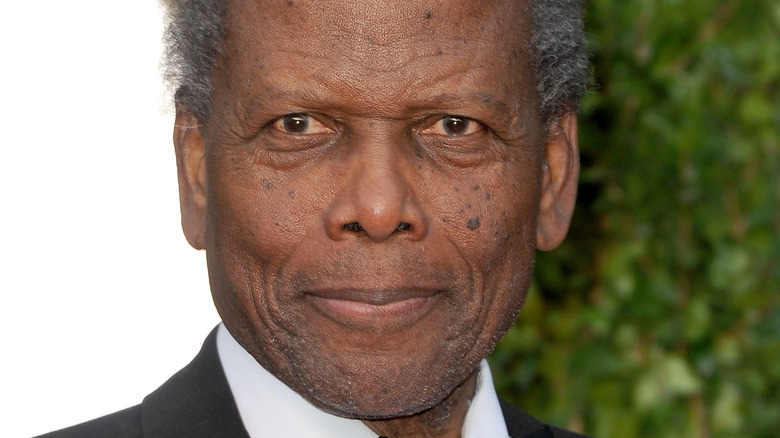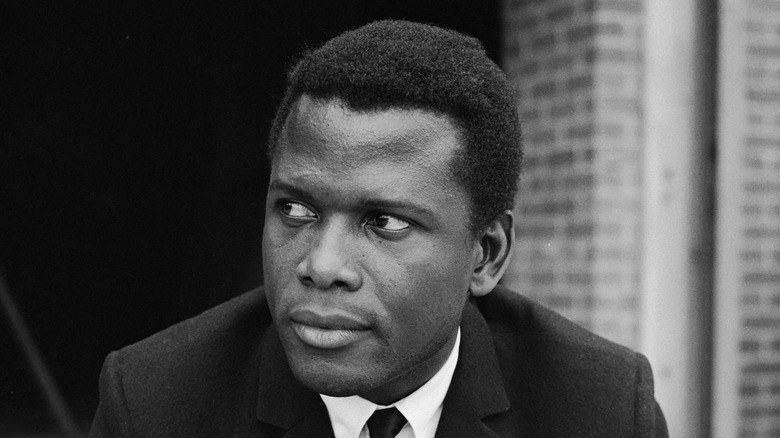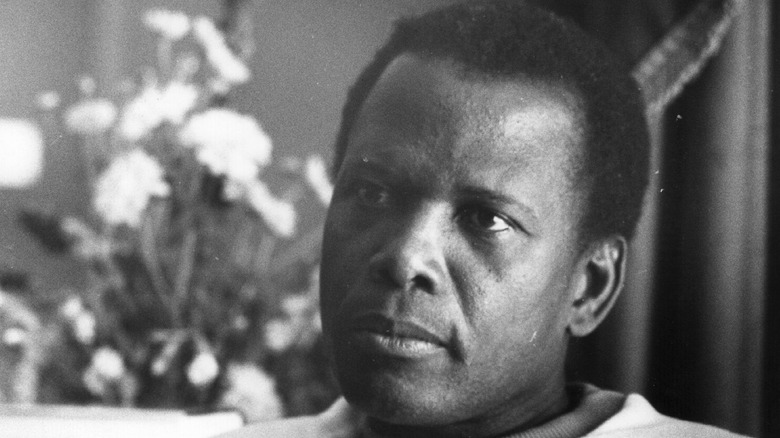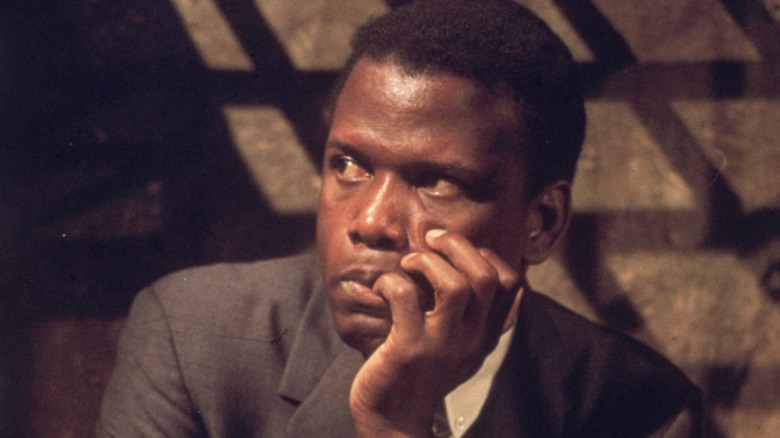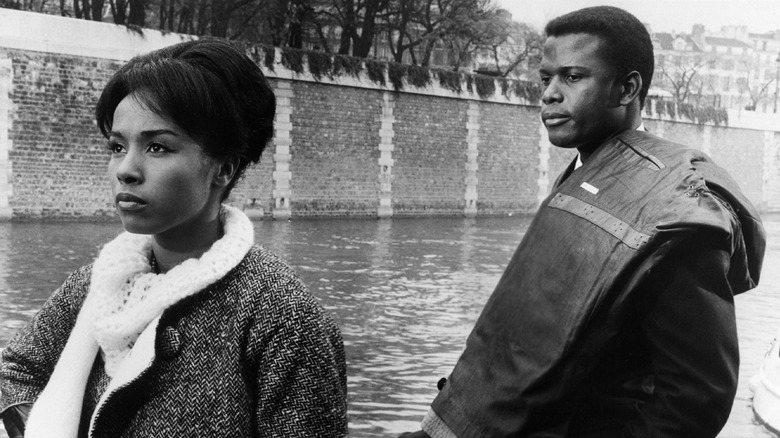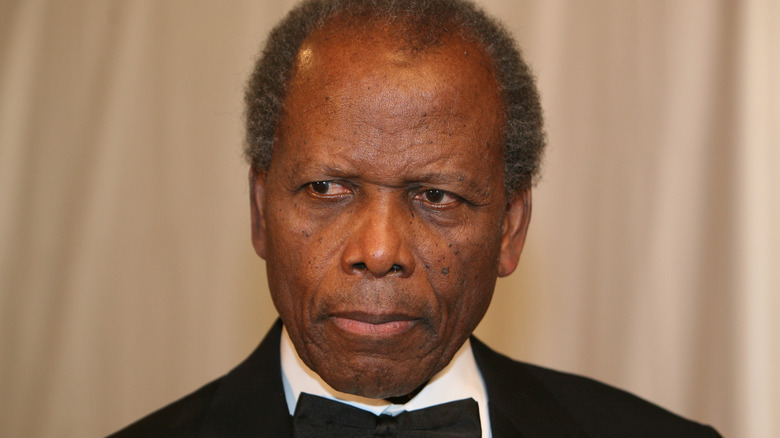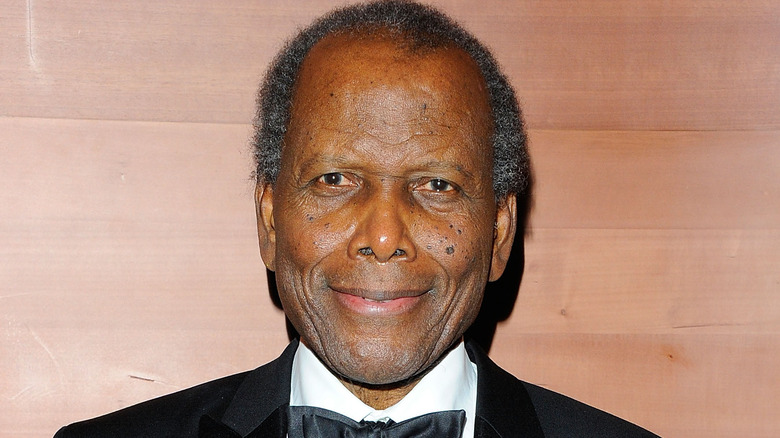Tragic Details About Sidney Poitier
On January 6, 2022, news broke of the death of legendary actor Sir Sidney Poitier, who passed away at age 94. The "Guess Who's Coming to Dinner" star is remembered for being an icon who paved the way for other Black actors and forever changed the face of the movie industry. Poitier was also the first Black man to win an Academy Award for Best Actor in 1964, and went on to become a director, author, civil rights activist, Honorary Knight Commander of the Order of the British Empire, and the Bahamas' ambassador to Japan.
When Poitier wasn't breaking down barriers and starring in popular movies, he was a family man. He left behind his wife of over 40 years, Joanna Shimkus, as well as a big family. The "A Raisin in the Sun" actor shared two daughters with Shimkus, and had four daughters from his previous marriage to Juanita Hardy. Despite his long list of professional accomplishments, Poitier told People in 2016, "My wife and my children mean the most to me."
When it came to Poitier's life, the "To Sir, With Love" star reflected, "I have been very lucky. I have tried to be a good human being, a good actor, a good director, a good filmmaker." Fans would agree he managed to do just that even when times were difficult. Despite his positive attitude, Poitier has definitely faced his fair share of obstacles and hardships over the years. So let's break down tragic details of his life that some may not know about.
Sidney Poitier had a rough start in life
Sidney Poitier's start was far from easy. He arrived on February 20, 1927, which was three months before his expected due date. As he shared with CBS News, his parents feared the worst. Searching for any sliver of hope, his mother reached out to a palm reader who told her that their baby would not only live, but "will walk with kings."
Long before Poitier would hobnob with world leaders, he grew up in the Bahamas and lived in "extreme poverty" and lacked "running water or electricity," per Oprah.com. At only age 15, he left for Miami. Yet things weren't much better in the States, with him recalling to NPR, "I couldn't adjust to the racism in Florida. It was so blatant." Opening up about the experience to Oprah, he remembered, "The law said, 'You cannot work here, live here, go to school here, shop here.' And I said, 'Why can't I?'" In that same interview, he shared that before he left his hometown, he wasn't warned that "there are things out there that are not friendly" for Black people.
Poitier eventually moved to New York City to pursue acting but was rejected from the American Negro Theater. Per Oprah.com, the director said, "Stop wasting your time—get a job as a dishwasher!" While that was a setback, Poitier told CBS News he did get a job at a restaurant where he met a waiter who helped him learn to read after work.
He dealt with racism on and off screen
Sidney Poitier experienced racism from the moment he moved to the United States. He recalled to Oprah, "Almost everything I heard said to me...Here, you are not the person you think you are." In the same interview, he reflected on how different this was from his hometown in the Bahamas. "There were two whites on our island," he said. "One was a doctor, another a shopkeeper's daughter. And it never dawned on me that they were anything but people."
Once Poitier made it in Hollywood, he still had to work extra hard to find roles that didn't perpetuate racist stereotypes. He explained to CBS, "If the screen does not make room for me in the structure of their screenplay, I'll step out." Not only did Poitier lose money by turning down those roles, but he told Oprah he had to take on some compromising parts like "Porgy & Bess," so he could get better opportunities in the future. He said in the same Oprah interview, "It was difficult. [Blacks] were so new in Hollywood. There was almost no frame of reference for us except as stereotypical, one-dimensional characters."
Poitier fought to be the kind of actor that he wanted to be, while speaking out to make a difference in the film industry as a whole. He said in a 1967 interview (via NBC), "the kind of Negro played on the screen was always negative, buffoons, clowns, shuffling butlers, really misfits...I chose not to be a party to the stereotyping."
He struggled with the press and critics
While Sidney Poitier worked to change how Black actors were portrayed on screen, he had to deal with the media. Poitier told Oprah that he'd often only get asked race-based questions, stating, "I resent them. I will not let the press thrust me into a definition by feeding me only race questions." He continued, "I am not all about race. I have had to [deal with this] all my career." Poitier famously shut down reporters who did that at a 1967 press junket(via PBS): "I am an awful lot of things, so I wish you would pay me the respect due and not simply ask me about those things."
In the '60s, he was also criticized by some Black audience members who felt that he was, as playwright Clifford Mason penned for The New York Times, "playing essentially the same role, the antiseptic, one-dimensional hero" who appealed to white audiences. When CBS asked about this in 2013, he responded, "I disagree with their point of view. ... I just simply say, 'I live by a certain code.' I have to have a certain amount of decency in my behavioral pattern."
Following the criticism, he reset by spent some time back home at the Bahamas. He told Oprah, "I lived through people turning on me. It was painful for a couple years." He continued, "The criticism I received was principally because I was usually the only Black in the movies. Personally, I thought that was a step!"
The actor's affair caused a lot of hurt
While Sidney Poitier had a long and happy marriage with his second wife, Joanna Shimkus, "The Defiant Ones" star led a tumultuous love life before that which seemingly took a toll on the actor. According to Closer Weekly, Poitier married his first wife, Juanita Hardy, in 1950, but his fame apparently caused them to drift apart. They eventually separated, and the actor told the outlet that it was "a long, painful, scarring period for all concerned" — especially since "Juanita had no interest in dismantling the family."
What's more, Poitier shared that he happened to be "in love" with his "Porgy & Bess" co-star Diahann Carroll. According to the New York Post, their affair lasted throughout most of the 1960s even though they both were married at the time. Poitier told People that he didn't officially end his marriage to Hardy to be with her, saying he "felt trapped by my four daughters." Regardless, the affair still damaged his relationship with his children. He explained, "There was a time when they were as mad as hell at me ...I was a villain of sorts in their eyes."
Despite their love, he and Carroll couldn't make it work because Poitier didn't want to be "jumping from one marriage straight into another." It appeared to be a very conflicting time in Poitier's life where he ended up hurting people he cared about as well as himself.
Sidney Poitier's daughter died suddenly in 2018
It's obvious that Sidney Poitier loved being a dad to his six daughters. He gushed to Oprah, "My children respect my values, and I can see some of those values in them. That pleases me...My kids are quite intelligent—all six of them." He even recalled a particular touching story where one of his daughters was proud of an award he received and said to him, "You're pretty good, Dad." He explained, "Now this is a kid who most of the time thinks I'm just an old fuddy-duddy, so I know when she says things like that, she's saying a lot more."
Tragically, the actor lost one of his children. His daughter Gina Poitier-Gouraige, who was from his first marriage to Juanita Hardy, passed away in 2018 at just 57 years old. Not only was it "quick and unexpected," according to People, but she left behind a husband who was her high school sweetheart, as well as three children. This wasn't the first bout with loss for the family, as Poitier-Gouraige's obituary noted that her fourth-born, Emmanuel, "preceded Gina in death."
Since Poitier has been notoriously private about his personal life, he did not release a statement regarding Poitier-Gouraige's death, and the cause was not revealed to public. The family said in her obituary (via People), "It is a gross understatement to say that she will be missed."
The screen legend was diagnosed with cancer
As Sidney Poitier shared with The New York Times Magazine in 2000, maintaining a very healthy lifestyle was important to him. And so, "alcohol, red meat, milk, sugar" were not parts of his diet. While he would sometimes have the "occasional scoop of ice cream," he did keep a "habit of eating vegetables at every meal." The outlet described him as being "a health food and exercise enthusiast for at least 40 years." About 16 years after the aforementioned New York Times Magazine interview was conducted, his wife, Joanna Shimkus, told People that one of their favorite things to do together was cook "Anything healthy." She added, "Lots of veggies, lots of chicken and fish, all wild and organic. I take good care of him."
All that said, cancer can impact even those who lead the most mindful and health-conscious of lifestyles. In 1993, Poitier was diagnosed with prostate cancer. Per the biography "Sidney Poitier: Man, Actor, Icon," the silver screen star treated it with surgery that same year and "was playing golf three weeks after leaving the hospital."
It's clear that the star had a long and happy life that was filled with career success, major milestones, and a loving family, but it did come with a lot tough times too. Yet Poitier appeared to have overcame the tragedies life threw at him and will always be remembered as a beloved actor who left a lasting mark on the world.

